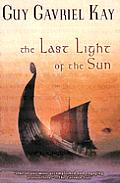Epic fantasy has a specific definition for me when I'm being precise, above and beyond the idea of a large, sprawling medieval world with magic. It is fantasy told in a particular mode, where the sweep of history moves through the story as something close to a character in its own right. It's a story about passions, about victory and loss and the clash of nations, traditions, and worlds. Characters in epic fantasy are significant to the world, doing great deeds, shaping and changing the future.
Epic fantasy is not where I look for realistic stories about average people in a different world or age. It often doesn't show you the mud, the rain, the stench, or the midden. Its characters may be unrealistically central to world events. It is, in short, stories about Great Things, about heroes and monsters and battle and high romance.
Guy Gavriel Kay is perhaps the best living writer of epic fantasy, and The Last Light of the Sun is up to his usual standards. However, this does mean that one has to be in the mood to read epic fantasy to enjoy it.
Set in the same alternate world as The Lions of Al-Rassan and The Sarantine Mosaic, The Last Light of the Sun takes place in that world's British isles, among the Celtic (Welsh to be precise), Anglo-Saxon, and Norse people, among warriors and raiders and cattle thieves, tribal people with varying kings. As usual, Kay casts the net of his plot far and wide, following Norse, Welsh, and Anglo-Saxon characters alike, men and women, through exile, raids gone bad, the demands of being the daughter of a king, and thwarted revenge. There are a lot of characters here, and a lot of plot strands; at first, perhaps slightly too many. In the background, one senses the slow march of growing civilization as power is concentrated in fewer kings who build up better defenses against raids. An analog of Christianity, the worship of a sun god, is also driving out older, more native beliefs.
And, for every moment of it, Kay doesn't let you forget that this is epic fantasy. The language of the story, flowing and easy to read, nonetheless has an elevated tone best suited for describing events of historic significance. The narrator doesn't leave events lying on the page, but instead shows you the characters' musings, points out the key moments, and digresses for short passages on the nature of heroism, the course of events, and the emotional significance of what has happened. This novel exudes epic from every page.
That's the most likely criticism of this book. The plot is frequently subtle; the tone is not. I can see the argument that it's trying too hard, but it works for me. It reminded me of Beowulf, of epic sagas that similarly weren't shy about calling out the greatness of the story. Given the history from which Kay is drawing, this felt fitting to me. It is a tone that takes a bit of getting used to, and if you fight against it, the book is likely to be frustrating. One has to go with the flow of the language, be drawn into the emotions of the tale, and imagine the sound of the storyteller's voice.
The plot is refreshingly free of any final villain. Instead, among occasional interludes from the perspective of supporting or incidental characters, it picks out a Welsh prince, a Welsh priest, an Anglo-Saxon king and his daughter, and a Norse raider, and follows them through their lives, into conflict and complex alliances. There's only one truly evil character, and he isn't the point of the story. Instead, the conflict mostly comes from politics and tribal animosity, past events, and partly from the influence of faerie.
While, alas, only the seelie appear and all too briefly for me, Kay's fairies are a delight. He strikes a balance between delicacy and a very inhuman outlook, and with just a few scenes he gives a hint of a culture that is very much other, concerned with far different matters than humanity. I love how Kay handles other worlds and the touches of the magical and fantastic in his books. He makes them wonderous and grave, avoiding the mechanical and analyzable (another sign, to me, of epic fantasy). The conflict between the sun god worship and the older native beliefs, embodied in faerie, is handled with a nice bit of two-sided storytelling, contributing to the sense that there is little right and wrong in this story, just different points of view. It's rather hard to manage this when one contradicts one of the doctrines of the sun god religion in the course of the story, but Kay confronts that head-on and pulls it off anyway. Very impressive.
There are so many different characters (the dramatis personae is useful at the beginning of the story), so widely scattered, that I wasn't sure if Kay was going to manage to pull everything together, but he does wonderfully in the end (with a quibble over the ease of resolution of the faerie subplot). I've never read a Kay novel that didn't leave me emotionally overwhelmed by the ending, and this one is no exception.
This is the sort of book where I think one's enjoyment depends greatly on whether you're in the mood to read what it offers. The Last Light of the Sun is not a flexible book or one that fits itself to the reader's mood. It's epic fantasy of a particular style, is proud of it, and insists on being read in that mode. I recommend saving it for when that's what you want to read, and avoiding it if you don't like that sort of thing at all. If you haven't liked any of Kay's previous work, this book won't convert you. For the right mood, though, it's magic, unhampered by its few slight flaws. Highly recommended.
Reviewed: 2005-06-30
